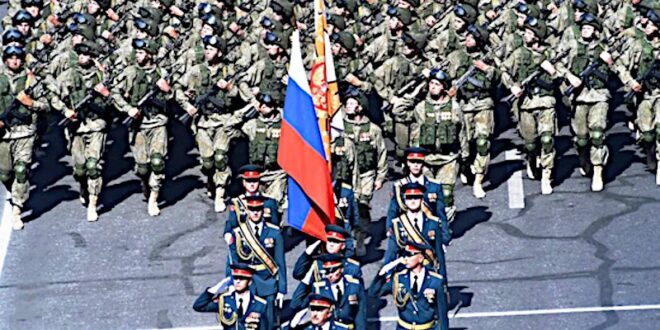A top Russian diplomat has warned that Moscow will respond “militarily” and deploy tactical nuclear weapons, if NATO does not guarantee an end to its eastward expansion.
His remarks raise the stakes even higher in the confrontation between Russia and Western powers just days after U.S. President Joe Biden and Russia’s Vladimir Putin held a two-hour video conference aimed at defusing a burgeoning crisis over Russian military movements near Ukraine’s borders, where the Kremlin is estimated to have amassed around 100,000 troops.
Deputy Foreign Minister Sergei Ryabkov’s threat comes amid rising fears that Putin is considering a further military incursion into Ukraine in a rehash of Russia’s 2014 annexation of the Crimean Peninsula and its seizure of a large part of the Donbas region in eastern Ukraine, bordering Russia.
In a phone call Monday, Britain’s Boris Johnson repeated to the Russian leader warnings that any repeat of 2014 would have “significant consequences” and any “destabilizing action” by Russia would be met with a united response by Western countries.
Following the call between Johnson and Putin, Ryabkov told the state-run RIA Novosti news agency Russia’s “response will be military,” if NATO continues to arm Ukraine. “A lack of progress towards a political-diplomatic solution would mean that our response will be military and military-technical,” Ryabkov said.
“There will be confrontation,” he added, saying Russia would deploy weapons previously banned under the Intermediate-Range Nuclear Forces (INF) Treaty, an arms control deal struck in 1987 by then US President Ronald Reagan and Soviet General Secretary Mikhail Gorbachev.
The treaty expired in 2019 but both Washington and Moscow have not moved to deploy the previously banned nuclear weapons.
According to British officials, Johnson stressed to Putin the importance of having a “dialogue on international and regional security” and that all sides needed to observe the Minsk agreements signed by Russia and Ukraine in 2015 which aimed to bring an end to fighting in Ukraine’s Donbas. Russia and Ukraine accuse each other of failing to comply with the Minsk agreements.
Last week, President Biden outlined in his call with Putin the economic sanctions the West would impose if Russian forces invaded Ukraine. A buildup of Russian troops along the border with Ukraine, and on the Crimean Peninsula, has prompted growing alarm in Western capitals and triggered an intense debate among Western policymakers over Putin’s intentions. Russian motorized infantry, artillery and armored units along the border Tuesday appeared to be carrying out drills practicing combat alerts and deploying to assembly points, according to Ukrainian officials.
Kremlin officials maintain Russia is not preparing to invade Ukraine and accuse the Ukrainians of mobilizing military units along their shared border. They say NATO is helping Kyiv to build up its forces and is being supplied with a significant number of weapons, including modern high-tech weapons.
In Kyiv on Tuesday, U.S. Assistant Secretary of State for European and Eurasian affairs Karen Donfried reassured Ukrainian officials of Washington’s continued commitment to Ukraine’s independence and territorial integrity. Donfried is due to meet Ryabkov in Moscow later this week.
Ukrainian President Volodymyr Zelenskiy, who is pressing NATO to admit his country as a member, told reporters Tuesday, “Ukraine gave up its nuclear arsenal in exchange of security guarantees from Russia. They were never respected. How can we trust any Russian promises?”
Putin has demanded Western powers guarantee in writing that Ukraine would not be a staging ground for NATO. Last week, Russia’s Foreign Ministry demanded Washington formally close the door on NATO membership for both Ukraine and Georgia. The Foreign Ministry also demanded that the Western alliance guarantee the non-deployment of weapons threatening Russia’s security on its western borders.
Ukraine’s foreign minister on Tuesday accused Putin of trying to return Europe to the Soviet era. “The fact Putin is searching for a new ideological justification concerning Ukraine suggests he’s on the verge of something big: an attempt to fundamentally rewrite the security order in Europe, to divide the continent into new spheres of influence,” Dmytro Kuleba said at a press conference, after his meeting with Donfried.
Western policymakers are split over why Putin has been amassing troops. They are also wrestling with their options for deterring him from making any dramatic military moves on Ukraine. Some former U.S. diplomats and officials believe Washington and its European allies should supply Ukraine with more high-tech weaponry, and sooner rather than later. They see the Kremlin’s anxiety over supplies of Western high-tech weapons as the best policy option to deter Russian adventurism.
The question U.S. and European policymakers must answer is whether they are “going to help Ukraine with the weapons and the training it needs to defend itself,” said Daniel Fried, a former American diplomat who served as assistant secretary of state for European and Eurasian affairs and was the U.S. ambassador to Poland from 1997 to 2000. The U.S. has increased its military supplies to Ukraine but Fried would like to see more.
“Ukrainians know how to use them. And I think the equipment needs to be delivered either now to deter the Russians or in the pipelines so the Russians know it can arrive very quickly,” he told VOA recently.
In Moscow, Kremlin officials say Putin planned to discuss the crisis in a call Wednesday with Chinese President Xi Jinping.
 Eurasia Press & News
Eurasia Press & News



